Module 5 Unit 2 If you ever go to London, make sure you visit the Science Museum. 学案(含答案) 2024-2025学
文档属性
| 名称 | Module 5 Unit 2 If you ever go to London, make sure you visit the Science Museum. 学案(含答案) 2024-2025学 |
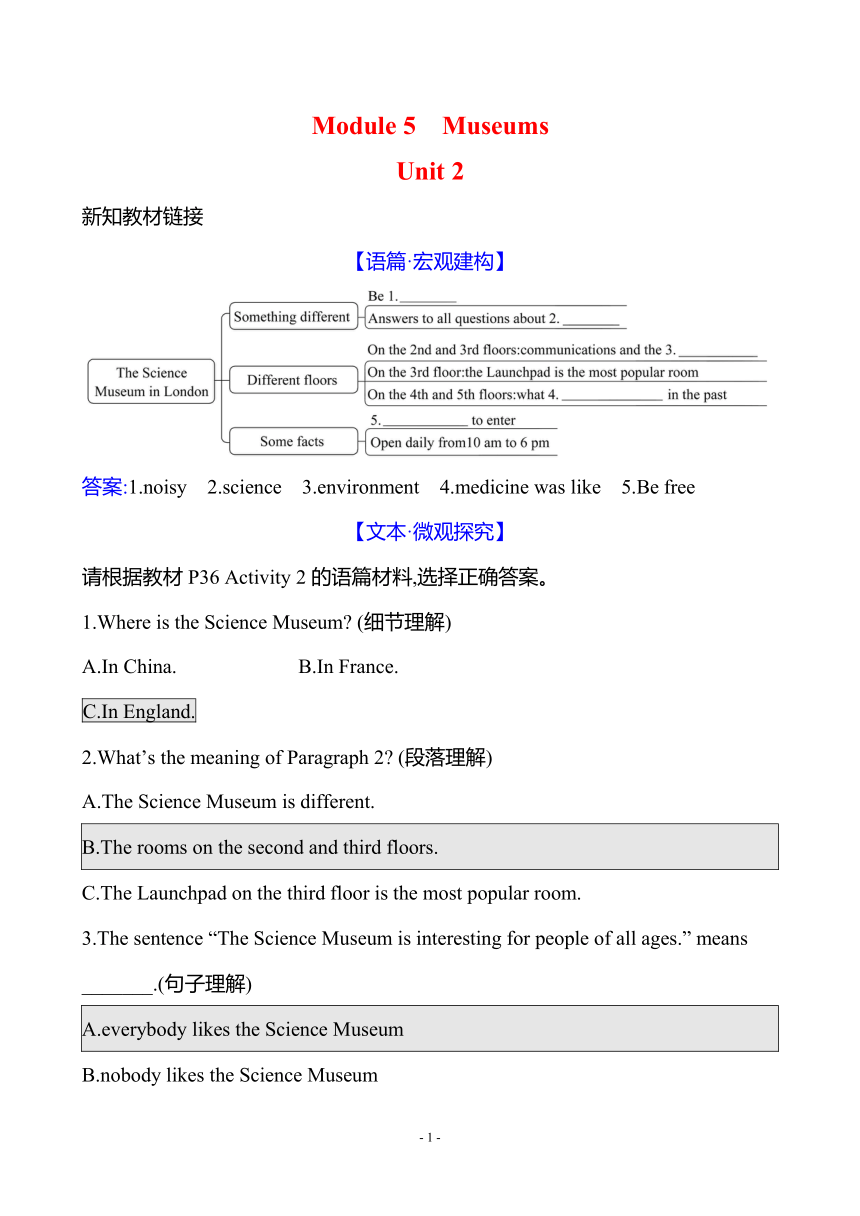
|
|
| 格式 | docx | ||
| 文件大小 | 225.9KB | ||
| 资源类型 | 教案 | ||
| 版本资源 | 外研版 | ||
| 科目 | 英语 | ||
| 更新时间 | 2024-06-10 00:00:00 | ||
图片预览

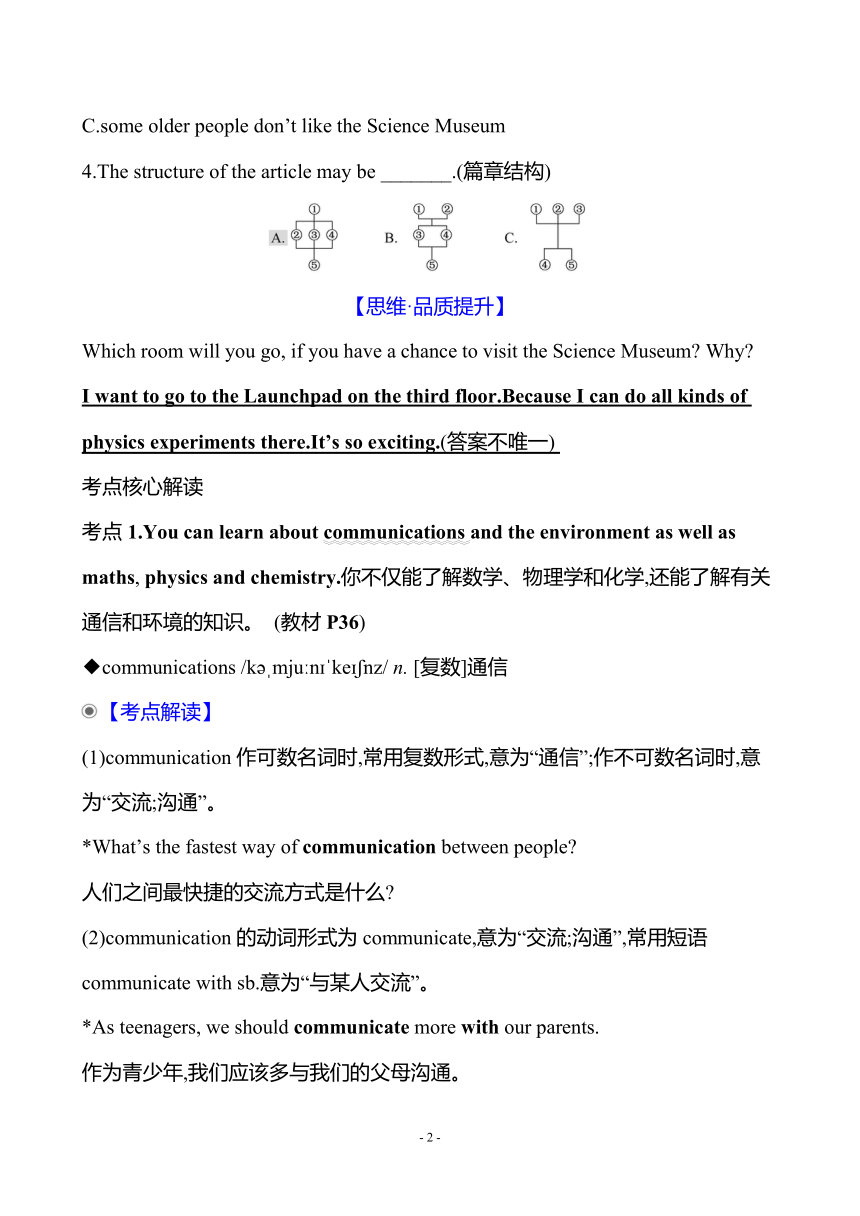
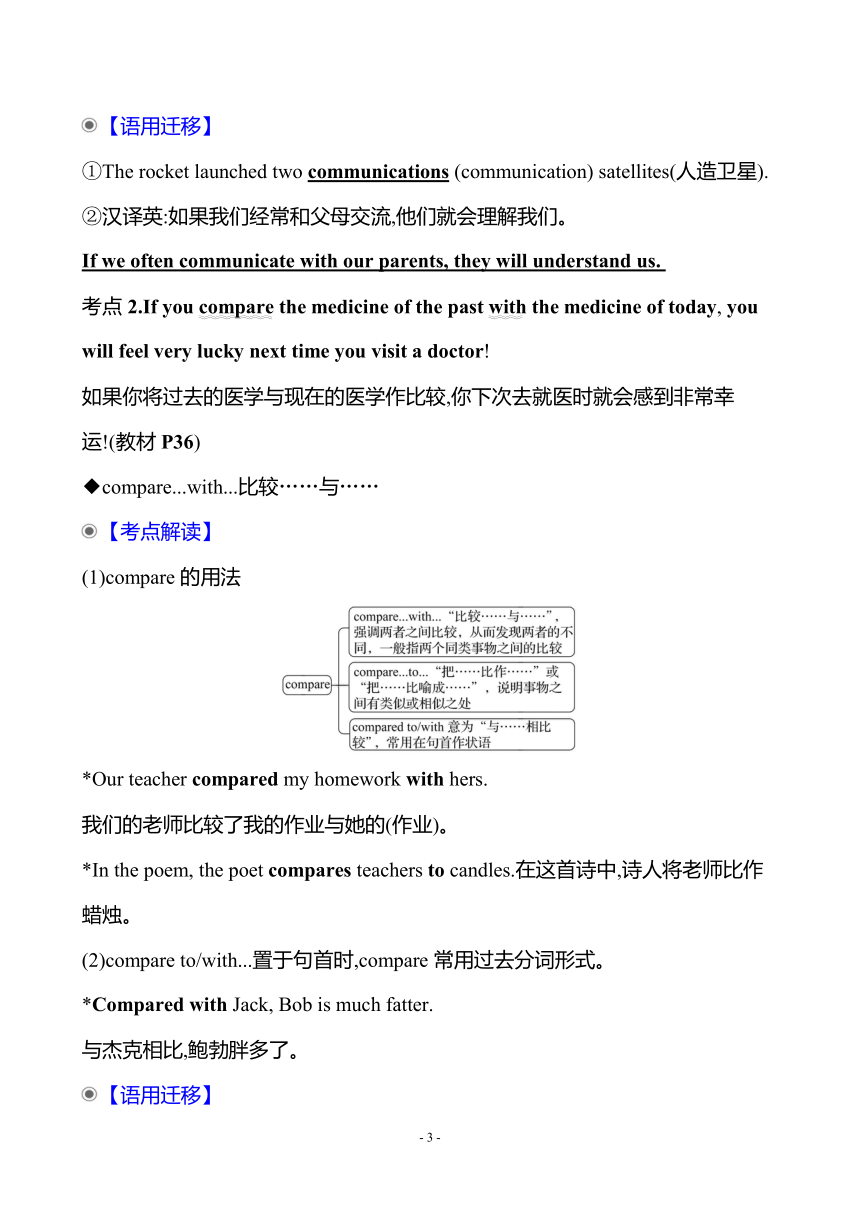
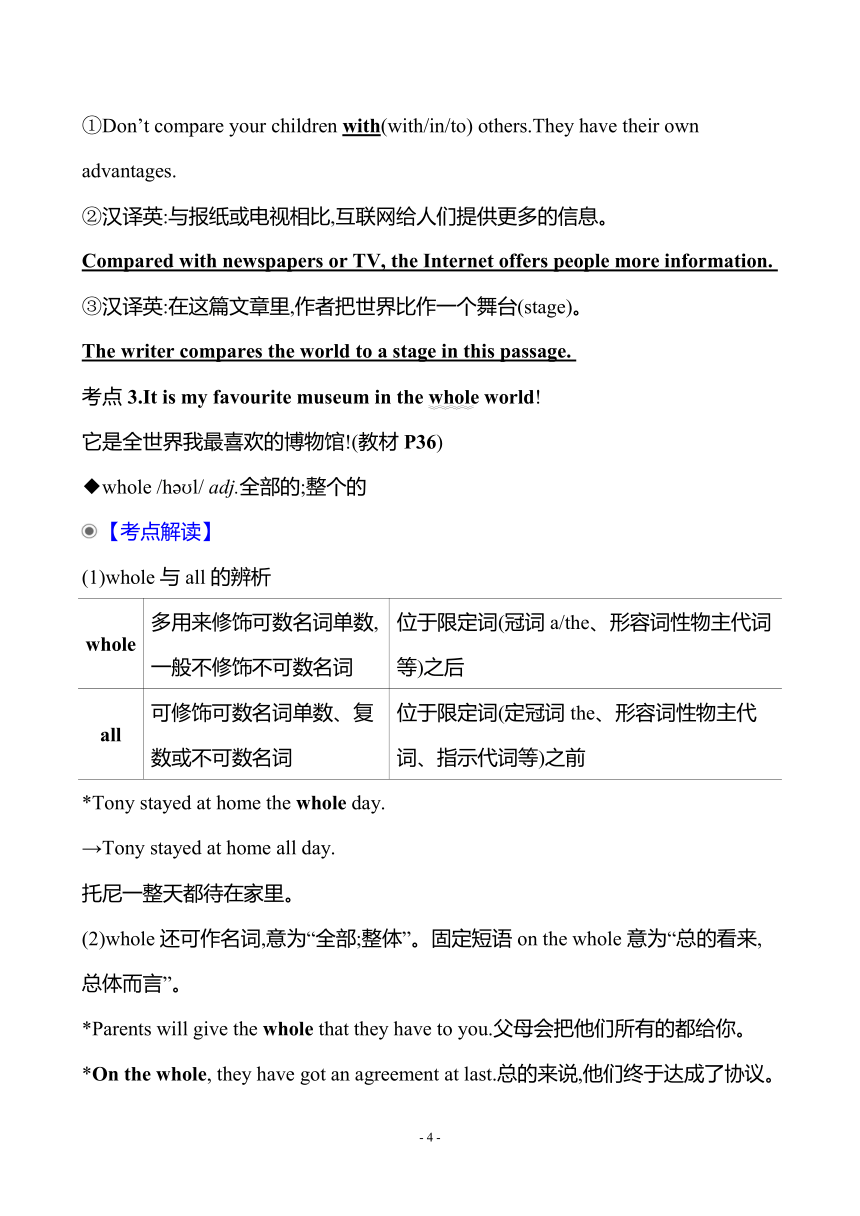
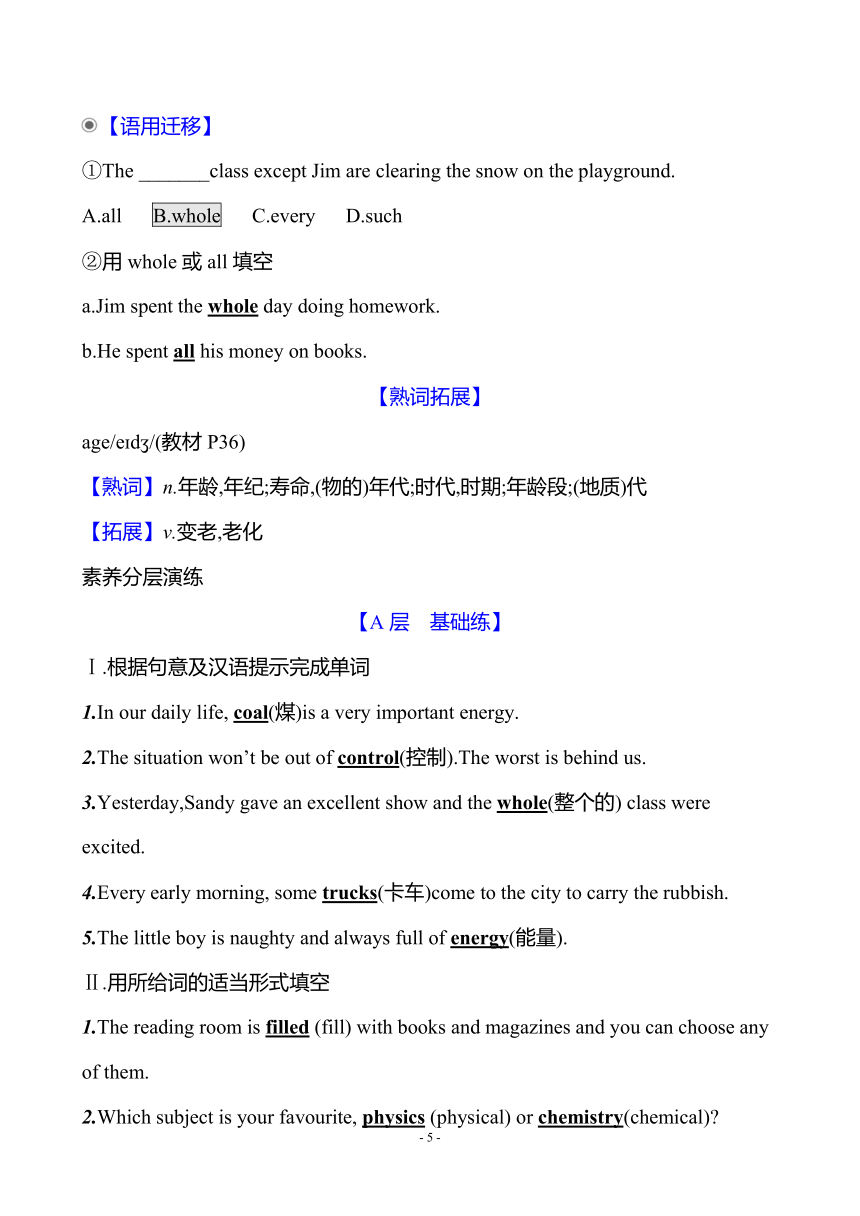
文档简介
Module 5 Museums
Unit 2
新知教材链接
【语篇·宏观建构】
答案:1.noisy 2.science 3.environment 4.medicine was like 5.Be free
【文本·微观探究】
请根据教材P36 Activity 2的语篇材料,选择正确答案。
1.Where is the Science Museum (细节理解)
A.In China. B.In France.
C.In England.
2.What’s the meaning of Paragraph 2 (段落理解)
A.The Science Museum is different.
B.The rooms on the second and third floors.
C.The Launchpad on the third floor is the most popular room.
3.The sentence “The Science Museum is interesting for people of all ages.” means _______.(句子理解)
A.everybody likes the Science Museum
B.nobody likes the Science Museum
C.some older people don’t like the Science Museum
4.The structure of the article may be _______.(篇章结构)
【思维·品质提升】
Which room will you go, if you have a chance to visit the Science Museum Why
I want to go to the Launchpad on the third floor.Because I can do all kinds of physics experiments there.It’s so exciting.(答案不唯一)
考点核心解读
考点1.You can learn about communications and the environment as well as maths, physics and chemistry.你不仅能了解数学、物理学和化学,还能了解有关通信和环境的知识。 (教材P36)
◆communications /k mju n ke nz/ n. [复数]通信
【考点解读】
(1)communication作可数名词时,常用复数形式,意为“通信”;作不可数名词时,意为“交流;沟通”。
*What’s the fastest way of communication between people
人们之间最快捷的交流方式是什么
(2)communication的动词形式为communicate,意为“交流;沟通”,常用短语communicate with sb.意为“与某人交流”。
*As teenagers, we should communicate more with our parents.
作为青少年,我们应该多与我们的父母沟通。
【语用迁移】
①The rocket launched two communications (communication) satellites(人造卫星).
②汉译英:如果我们经常和父母交流,他们就会理解我们。
If we often communicate with our parents, they will understand us.
考点2.If you compare the medicine of the past with the medicine of today, you will feel very lucky next time you visit a doctor!
如果你将过去的医学与现在的医学作比较,你下次去就医时就会感到非常幸运!(教材P36)
◆compare...with...比较……与……
【考点解读】
(1)compare的用法
*Our teacher compared my homework with hers.
我们的老师比较了我的作业与她的(作业)。
*In the poem, the poet compares teachers to candles.在这首诗中,诗人将老师比作蜡烛。
(2)compare to/with...置于句首时,compare常用过去分词形式。
*Compared with Jack, Bob is much fatter.
与杰克相比,鲍勃胖多了。
【语用迁移】
①Don’t compare your children with(with/in/to) others.They have their own advantages.
②汉译英:与报纸或电视相比,互联网给人们提供更多的信息。
Compared with newspapers or TV, the Internet offers people more information.
③汉译英:在这篇文章里,作者把世界比作一个舞台(stage)。
The writer compares the world to a stage in this passage.
考点3.It is my favourite museum in the whole world!
它是全世界我最喜欢的博物馆!(教材P36)
◆whole /h l/ adj.全部的;整个的
【考点解读】
(1)whole与all的辨析
whole 多用来修饰可数名词单数,一般不修饰不可数名词 位于限定词(冠词a/the、形容词性物主代词等)之后
all 可修饰可数名词单数、复数或不可数名词 位于限定词(定冠词the、形容词性物主代词、指示代词等)之前
*Tony stayed at home the whole day.
→Tony stayed at home all day.
托尼一整天都待在家里。
(2)whole还可作名词,意为“全部;整体”。固定短语on the whole意为“总的看来,总体而言”。
*Parents will give the whole that they have to you.父母会把他们所有的都给你。
*On the whole, they have got an agreement at last.总的来说,他们终于达成了协议。
【语用迁移】
①The _______class except Jim are clearing the snow on the playground.
A.all B.whole C.every D.such
②用whole或all填空
a.Jim spent the whole day doing homework.
b.He spent all his money on books.
【熟词拓展】
age/e d /(教材P36)
【熟词】n.年龄,年纪;寿命,(物的)年代;时代,时期;年龄段;(地质)代
【拓展】v.变老,老化
素养分层演练
【A层 基础练】
Ⅰ.根据句意及汉语提示完成单词
1.In our daily life, coal(煤)is a very important energy.
2.The situation won’t be out of control(控制).The worst is behind us.
3.Yesterday,Sandy gave an excellent show and the whole(整个的) class were excited.
4.Every early morning, some trucks(卡车)come to the city to carry the rubbish.
5.The little boy is naughty and always full of energy(能量).
Ⅱ.用所给词的适当形式填空
1.The reading room is filled (fill) with books and magazines and you can choose any of them.
2.Which subject is your favourite, physics (physical) or chemistry(chemical)
3.After hundreds of experiments (experiment), Edison successfully invented the light bulb.
4.The Internet is the most important progress in the field of communications (communicate).
5.—What are you doing, Tony
—I am digging (dig) a hole to plant flowers.
【B层 能力练】
Ⅲ.阅读理解(主题:人类发明与创新·建议用时6')
The American Computer Museum was open to visitors in 1990 in Bozeman,Montana.At first it was planned to build in Princeton,New Jersey.The founders moved to Bozeman in 1988 and after looking at the area they decided to start the museum there.With Yellowstone National Park to the south and Glacier National Park to the northwest,the museum attracts(吸引)thousands of visitors from all 50 states and over 50 countries.The American Computer Museum has been written about in many publications such as The New York Times,The New Yorker Magazine,The Los Angeles Times,PC Week,QST Magazine and USA Today.
When visitors first enter the museum,they are shown a video introducing the museum and its collections.All visitors are given the chance to join in tours led by friendly tour guides.It has had visitors aged from 3 to 93—it is a big family.Over 1,000 exhibitions are shown in the 6,000 square metres museum.Travelling through the museum,you will see the exciting 20,000 years of history of the information age.Technology becomes easier to accept when one learns about its origins(起源)in the natural process(进程)of human development.
1.Where is the American Computer Museum
A.In Montana. B.In New Jersey.
C.In New York. D.In Los Angeles.
2.People can visit _______,which is to the south of the museum.
A.the Brooklyn Bridge
B.the Gateway Arch
C.Glacier National Park
D.Yellowstone National Park
3.What does the word “publications” mean in Chinese
A.畅销书 B.名人录
C.出版物 D.地图册
4.The oldest visitor in history is _______.
A.50 years old B.93 years old
C.a tour guide D.the founder
5.Visitors can see more than _______exhibitions at the American Computer Museum.
A.1,000 B.2,000
C.10,000 D.20,000
Ⅳ.完形填空(主题:学校规则·建议用时8')
(2023·安徽中考)
Dear Bruce,
Thanks for your email—good to hear from you.I’m looking forward to the exchange (交流), too!
Anyway, about the 1 and things. The school here isn’t very 2 about most things, but there are a few things you need to know.First of all— 3 .You can wear what you want, 4 you can’t wear jeans (牛仔裤) with holes in them.You should 5 comfortable things.And it’ll be cold when you’re here so you’d better bring some 6 clothes.
The school is pretty strict about phones—of course you can 7 them, but you have to 8 the phones and keep them in a place as you are required before class.You can’t just put them on silent, right And you can bring 9 to school but you must eat it outside during the break.If it’s raining, you can eat in the classroom.
In short, it’s a good school and the teachers are kind.You really don’t have to worry about anything here.Hope my advice is 10 to you.Write again soon, OK And tell me if there’s anything else you need to know.
Yours,
Sarah
1.A.interviews B.hobbies
C.marks D.rules
2.A.strict B.fair C.modern D.sure
3.A.questions B.reports
C.clothes D.subjects
4.A.or B.so C.for D.but
5.A.borrow B.wear C.receive D.sell
6.A.clean B.dry C.warm D.new
7.A.bring B.return
C.compare D.repair
8.A.hand out B.throw away
C.turn off D.pick up
9.A.money B.food C.paper D.water
10.A.helpful B.similar C.secret D.free
Ⅴ.语法填空(主题:公共秩序·建议用时7')
(2023·杭州中考)
Traffic School
Have you ever driven through a red traffic light Have you ever parked in the wrong place or driven 1.faster (fast) than the speed limit (限制) The answers are probably “yes” .Every year 2.thousands (thousand) of drivers become “offenders”—they break the rules of the road.But 3.what are the punishments for this offence
In most countries drivers have to pay a fine (罚款), 4.usually (usual) $100—$300.But in the USA, Australia and some 5.European (Europe) countries offenders also get points on their driving license.After they get 6.a certain number of points, they can’t drive.
Life is difficult when you can’t drive.So far some states in the USA 7.have introduced (introduce) a new way to avoid this—Traffic School.Offenders have a choice: They can get points on their license 8.if they can do a course at Traffic School.
Traffic Schools run“driver improvement course” .They cost about $100 and take from four 9.to twelve hours.Most people do the course in a classroom, but in some states drivers can do the course online.Drivers learn the rules of the road and they learn how 10.to be (be) better drivers.They don’t have to take a driving test, but at the end of the course they have to pass a written examination.
- 10 -
Unit 2
新知教材链接
【语篇·宏观建构】
答案:1.noisy 2.science 3.environment 4.medicine was like 5.Be free
【文本·微观探究】
请根据教材P36 Activity 2的语篇材料,选择正确答案。
1.Where is the Science Museum (细节理解)
A.In China. B.In France.
C.In England.
2.What’s the meaning of Paragraph 2 (段落理解)
A.The Science Museum is different.
B.The rooms on the second and third floors.
C.The Launchpad on the third floor is the most popular room.
3.The sentence “The Science Museum is interesting for people of all ages.” means _______.(句子理解)
A.everybody likes the Science Museum
B.nobody likes the Science Museum
C.some older people don’t like the Science Museum
4.The structure of the article may be _______.(篇章结构)
【思维·品质提升】
Which room will you go, if you have a chance to visit the Science Museum Why
I want to go to the Launchpad on the third floor.Because I can do all kinds of physics experiments there.It’s so exciting.(答案不唯一)
考点核心解读
考点1.You can learn about communications and the environment as well as maths, physics and chemistry.你不仅能了解数学、物理学和化学,还能了解有关通信和环境的知识。 (教材P36)
◆communications /k mju n ke nz/ n. [复数]通信
【考点解读】
(1)communication作可数名词时,常用复数形式,意为“通信”;作不可数名词时,意为“交流;沟通”。
*What’s the fastest way of communication between people
人们之间最快捷的交流方式是什么
(2)communication的动词形式为communicate,意为“交流;沟通”,常用短语communicate with sb.意为“与某人交流”。
*As teenagers, we should communicate more with our parents.
作为青少年,我们应该多与我们的父母沟通。
【语用迁移】
①The rocket launched two communications (communication) satellites(人造卫星).
②汉译英:如果我们经常和父母交流,他们就会理解我们。
If we often communicate with our parents, they will understand us.
考点2.If you compare the medicine of the past with the medicine of today, you will feel very lucky next time you visit a doctor!
如果你将过去的医学与现在的医学作比较,你下次去就医时就会感到非常幸运!(教材P36)
◆compare...with...比较……与……
【考点解读】
(1)compare的用法
*Our teacher compared my homework with hers.
我们的老师比较了我的作业与她的(作业)。
*In the poem, the poet compares teachers to candles.在这首诗中,诗人将老师比作蜡烛。
(2)compare to/with...置于句首时,compare常用过去分词形式。
*Compared with Jack, Bob is much fatter.
与杰克相比,鲍勃胖多了。
【语用迁移】
①Don’t compare your children with(with/in/to) others.They have their own advantages.
②汉译英:与报纸或电视相比,互联网给人们提供更多的信息。
Compared with newspapers or TV, the Internet offers people more information.
③汉译英:在这篇文章里,作者把世界比作一个舞台(stage)。
The writer compares the world to a stage in this passage.
考点3.It is my favourite museum in the whole world!
它是全世界我最喜欢的博物馆!(教材P36)
◆whole /h l/ adj.全部的;整个的
【考点解读】
(1)whole与all的辨析
whole 多用来修饰可数名词单数,一般不修饰不可数名词 位于限定词(冠词a/the、形容词性物主代词等)之后
all 可修饰可数名词单数、复数或不可数名词 位于限定词(定冠词the、形容词性物主代词、指示代词等)之前
*Tony stayed at home the whole day.
→Tony stayed at home all day.
托尼一整天都待在家里。
(2)whole还可作名词,意为“全部;整体”。固定短语on the whole意为“总的看来,总体而言”。
*Parents will give the whole that they have to you.父母会把他们所有的都给你。
*On the whole, they have got an agreement at last.总的来说,他们终于达成了协议。
【语用迁移】
①The _______class except Jim are clearing the snow on the playground.
A.all B.whole C.every D.such
②用whole或all填空
a.Jim spent the whole day doing homework.
b.He spent all his money on books.
【熟词拓展】
age/e d /(教材P36)
【熟词】n.年龄,年纪;寿命,(物的)年代;时代,时期;年龄段;(地质)代
【拓展】v.变老,老化
素养分层演练
【A层 基础练】
Ⅰ.根据句意及汉语提示完成单词
1.In our daily life, coal(煤)is a very important energy.
2.The situation won’t be out of control(控制).The worst is behind us.
3.Yesterday,Sandy gave an excellent show and the whole(整个的) class were excited.
4.Every early morning, some trucks(卡车)come to the city to carry the rubbish.
5.The little boy is naughty and always full of energy(能量).
Ⅱ.用所给词的适当形式填空
1.The reading room is filled (fill) with books and magazines and you can choose any of them.
2.Which subject is your favourite, physics (physical) or chemistry(chemical)
3.After hundreds of experiments (experiment), Edison successfully invented the light bulb.
4.The Internet is the most important progress in the field of communications (communicate).
5.—What are you doing, Tony
—I am digging (dig) a hole to plant flowers.
【B层 能力练】
Ⅲ.阅读理解(主题:人类发明与创新·建议用时6')
The American Computer Museum was open to visitors in 1990 in Bozeman,Montana.At first it was planned to build in Princeton,New Jersey.The founders moved to Bozeman in 1988 and after looking at the area they decided to start the museum there.With Yellowstone National Park to the south and Glacier National Park to the northwest,the museum attracts(吸引)thousands of visitors from all 50 states and over 50 countries.The American Computer Museum has been written about in many publications such as The New York Times,The New Yorker Magazine,The Los Angeles Times,PC Week,QST Magazine and USA Today.
When visitors first enter the museum,they are shown a video introducing the museum and its collections.All visitors are given the chance to join in tours led by friendly tour guides.It has had visitors aged from 3 to 93—it is a big family.Over 1,000 exhibitions are shown in the 6,000 square metres museum.Travelling through the museum,you will see the exciting 20,000 years of history of the information age.Technology becomes easier to accept when one learns about its origins(起源)in the natural process(进程)of human development.
1.Where is the American Computer Museum
A.In Montana. B.In New Jersey.
C.In New York. D.In Los Angeles.
2.People can visit _______,which is to the south of the museum.
A.the Brooklyn Bridge
B.the Gateway Arch
C.Glacier National Park
D.Yellowstone National Park
3.What does the word “publications” mean in Chinese
A.畅销书 B.名人录
C.出版物 D.地图册
4.The oldest visitor in history is _______.
A.50 years old B.93 years old
C.a tour guide D.the founder
5.Visitors can see more than _______exhibitions at the American Computer Museum.
A.1,000 B.2,000
C.10,000 D.20,000
Ⅳ.完形填空(主题:学校规则·建议用时8')
(2023·安徽中考)
Dear Bruce,
Thanks for your email—good to hear from you.I’m looking forward to the exchange (交流), too!
Anyway, about the 1 and things. The school here isn’t very 2 about most things, but there are a few things you need to know.First of all— 3 .You can wear what you want, 4 you can’t wear jeans (牛仔裤) with holes in them.You should 5 comfortable things.And it’ll be cold when you’re here so you’d better bring some 6 clothes.
The school is pretty strict about phones—of course you can 7 them, but you have to 8 the phones and keep them in a place as you are required before class.You can’t just put them on silent, right And you can bring 9 to school but you must eat it outside during the break.If it’s raining, you can eat in the classroom.
In short, it’s a good school and the teachers are kind.You really don’t have to worry about anything here.Hope my advice is 10 to you.Write again soon, OK And tell me if there’s anything else you need to know.
Yours,
Sarah
1.A.interviews B.hobbies
C.marks D.rules
2.A.strict B.fair C.modern D.sure
3.A.questions B.reports
C.clothes D.subjects
4.A.or B.so C.for D.but
5.A.borrow B.wear C.receive D.sell
6.A.clean B.dry C.warm D.new
7.A.bring B.return
C.compare D.repair
8.A.hand out B.throw away
C.turn off D.pick up
9.A.money B.food C.paper D.water
10.A.helpful B.similar C.secret D.free
Ⅴ.语法填空(主题:公共秩序·建议用时7')
(2023·杭州中考)
Traffic School
Have you ever driven through a red traffic light Have you ever parked in the wrong place or driven 1.faster (fast) than the speed limit (限制) The answers are probably “yes” .Every year 2.thousands (thousand) of drivers become “offenders”—they break the rules of the road.But 3.what are the punishments for this offence
In most countries drivers have to pay a fine (罚款), 4.usually (usual) $100—$300.But in the USA, Australia and some 5.European (Europe) countries offenders also get points on their driving license.After they get 6.a certain number of points, they can’t drive.
Life is difficult when you can’t drive.So far some states in the USA 7.have introduced (introduce) a new way to avoid this—Traffic School.Offenders have a choice: They can get points on their license 8.if they can do a course at Traffic School.
Traffic Schools run“driver improvement course” .They cost about $100 and take from four 9.to twelve hours.Most people do the course in a classroom, but in some states drivers can do the course online.Drivers learn the rules of the road and they learn how 10.to be (be) better drivers.They don’t have to take a driving test, but at the end of the course they have to pass a written examination.
- 10 -
同课章节目录
- Module 1 Wonders of the world
- Unit 1 It's more than 2,000 years old.
- Unit 2 The Grand Canyon was not just big.
- Unit 3 Language in use
- Module 2 Public holidays
- Unit 1 My family always go somewhere interesting a
- Unit 2 We have celebrated the festival since the f
- Unit 3 Language in use
- Module 3 Heroes
- Unit 1 She trained hard,so she became a great play
- Unit 2There were few doctors, so he had to work ve
- Unit 3 Language in use
- Module 4 Home alone
- Unit 1 I can look after myself, although it won’t
- Unit 2 I became so bored with their orders that I
- Unit 3 Language in use
- Module 5 Museums
- Unit 1 Don't cross that rope!
- Unit 2 If you ever go to London, make sure you vis
- Unit 3 Language in use
- Module 6 Problems
- Unit 1 If I start after dinner, I'll finish it be
- Unit 2 If you tell him the truth now, you will sho
- Unit 3 Language in use
- Revision Module A
- Module 7 Great books
- Unit 1 We're still influenced by Confucius's idea
- Unit 2 It is still read and loved.
- Unit 3 Language in use
- Module 8 Sports life
- Unit 1 Daming wasn't chosen for the team last time
- Unit 2 He was invited to competitions around the w
- Unit 3 Language in use
- Module 9 Great inventions
- Unit 1 Will computers be used more than books in t
- Unit 2 Will books be replaced by the Internet?
- Unit 3 Language in use
- Module 10 Australia
- Unit 1 I have some photos that I took in Australia
- Unit 2 The game that they like most is Australian
- Unit 3 Language in use
- Module 11 Photos
- Unit 1 He's the boy who won the photo competition
- Unit 2 The photo which we liked best was taken by
- Unit 3 Language in use
- Module 12 Save our world
- Unit 1 If everyone starts to do something, the wor
- Unit 2 Repeat these three words daily: reduce, reu
- Unit 3 Language in use
- Revision Module B
